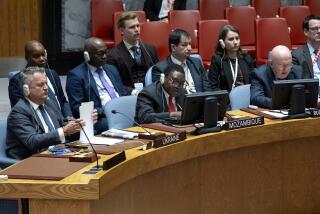Where to Put Two U.N. Elephants : Claims of Germany, Japan are sensible, but . . .
- Share via
Addressing the U.N. General Assembly this week, the foreign ministers of Germany and Japan each made clear that their countries believe they are ready for permanent seats on the Security Council. It’s a reasonable expectation, in theory.
The bid in each case was low-key--for now there will be no active lobbying for the seats--but emphatic. The target date for achieving their aims is 1995, the United Nations’ 50th anniversary. And so in a quiet way each has begun a campaign that could prove to be one of the United Nations’ greatest political tests.
The five permanent members of the Security Council are the chief allies of World War II--the United States, Russia, Britain, France and China. None, of course, is ready to give up its seat or the veto power over council actions granted it by the U.N. Charter. If Germany and Japan were to become permanent members, the charter would have to be amended to enlarge the council. The procedure for doing that requires approval by two-thirds of the full membership, including the five permanent members. Here is where the political sparks would be struck.
Japan and Germany, with the world’s second- and third-biggest economies, have strong claims to having their international importance further recognized with permanent seats on the Security Council. In the past the United States has quietly supported the principle of their membership. But Washington has also urged on its friends a go-slow approach in pursuing this aim.
A chief concern is that a conference called to revise the charter to give Tokyo and Bonn what they want could also become a forum for the pressing of other claims, including enlarging the Security Council to take in more Third World countries. Whatever the merits of that idea, it would, if adopted, inevitably make consensus-building harder while diluting the political powers of the current five permanent members. None of them would welcome that; each is in a position to prevent it. Remember that the charter can be revised only with the support of the five, and must be ratified by members “in accordance with their respective constitutional processes.” For the United States, that means winning the approval of two-thirds of the Senate, not an easy thing. A rejection by even one of the permanent members of charter amendments proposed by a conference of the whole membership could fuel internal tensions that could even tear the United Nations apart.
What might at first glance seem to be a relatively simple matter--giving Japan and Germany the recognition that their economic strength entitles them to--thus turns out to raise some very complicated issues. The United Nations exists to try to find peaceful solutions to complex problems. Here is one that is likely to tax its diplomatic skills to the maximum.
More to Read
Sign up for Essential California
The most important California stories and recommendations in your inbox every morning.
You may occasionally receive promotional content from the Los Angeles Times.













